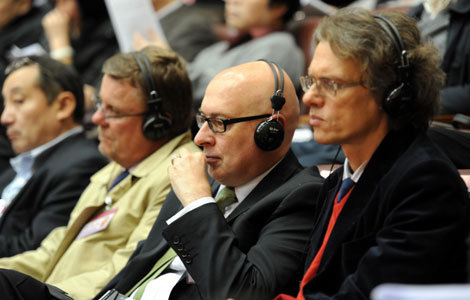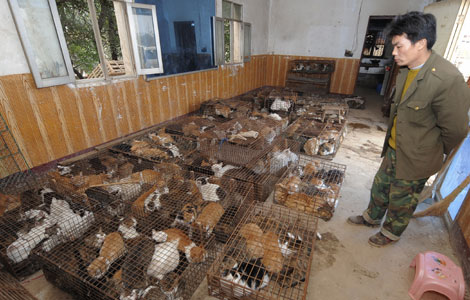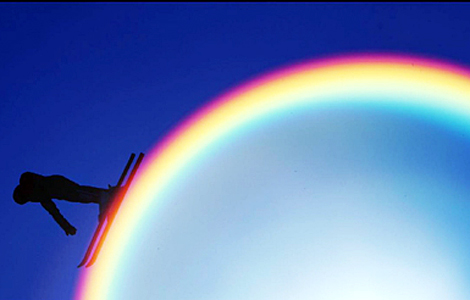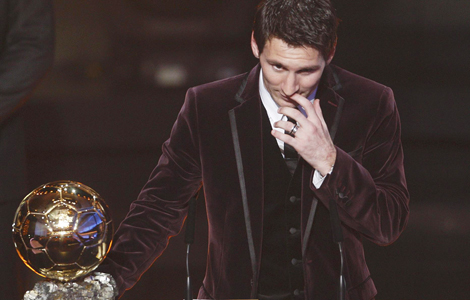Setting my resolutions for Chinese New Year
Updated: 2012-01-13 10:08
By Brian Salter (chinadaily.com.cn)
|
|||||||||||
With the Year of the Dragon practically upon us, and with the solar New Year fast fading into distant memory, I have been ruminating over the habit that so many people have of making new year resolutions … and then breaking them just months/weeks/days/hours/minutes after making them.
January 1 became the beginning of the New Year in 46 BC, when Julius Caesar developed a calendar that would more accurately reflect the seasons than previous calendars had.
The Romans named the first month of the year after Janus, the god of beginnings and the guardian of doors and entrances. He was always depicted with two faces, one on the front of his head and one on the back. Thus he could look backward and forward at the same time. At midnight on December 31, the Romans imagined Janus looking back at the old year and forward to the new.
In the Middle Ages, Christians changed New Year's Day to December 25, the birth of Jesus. Then they changed it to March 25 - the Annunciation holiday. In the sixteenth century, Pope Gregory XIII revised the Julian calendar, and the celebration of the New Year was returned to January 1.
But what of Chinese New Year? Friends of mine that I have asked appear to be in two minds about whether the Chinese set themselves New Year resolutions during the Spring Festival. But some of the foreign workers I have spoken to tell me they intend to do so, as if the mixing together of East and West will make them feel more at home in their foreign temporary abode.
High on the wish list of practically every expat here is a determination to improve their Chinese language skills. Whether it is a case of doing as I do – switching on my MP3 player whenever I travel on the bus or subway, and listening to a Chinese language lesson - or signing up to a proper language course; determining to go down to the local vegetable market and learning the name of a new vegetable on every visit; or trying to make conversation with a taxi driver, it is all too easy to make excuses and not make the required progress.
I used to face this problem when I lived in the Middle East, since most people I tried to practice my Arabic on insisted on replying in English. In the event I taught myself to learn to read the Arabic alphabet instead – a particularly useful skill, it turned out, as in my work I used to lay out magazines and put together web sites. So now I am slowly starting to learn some of the Chinese ideograms, not only with the help of a book I downloaded off the Internet, but also by going through the names of the various Beijing subway stations , noting commonly used "syllables" and getting to recognize the way they are written.
Another "essential" resolution we all share is to get to know Beijing better. The majority of expats I know do this by going out with other like-minded expats and going to the well known tourist spots and then slowly widening their experience. While this may be fine for some people, I prefer to leave all my Western friends behind and just take off for the day, armed only with a good map and having thoroughly researched some of the more esoteric things in the vicinity to which I am going. Having a Chinese friend accompany me adds an extra level of interest as they can explain things that foreigners simply wouldn't know.
When I tell my Western friends where I have been, they look at me in astonishment; but I find this is the only way to get to know a place better. Soon to be visited places on my Beijing list are the Eunuch Museum in the west of the capital, and a Museum of Tap Water near Dongzhimen. It's not that I expect them to be outstanding in any way (though if they are, then that is definitely a bonus), but as they are (as far as I am aware) the only such museums of their kind, I feel that my horizons can be suitably widened while at the same time it sure makes for interesting conversations at a later date.
Finally, one resolution I will certainly try to keep on keeping is to carry on recording my observations in a personal blog. The thing is that at some point in the future, everything that appears new and exciting now will start to feel normal. The "wow" factor you get when discovering some thing new will have disappeared and it won’t be until much later that you'll wish you had kept better notes.
The author is a broadcaster and journalist who spent 10 years working in Saudi Arabia and Dubai before moving to Beijing in 2011.
- Inflation drop may see shift in govt policy
- Spokespersons for religious groups
- Housing policy to continue in capital
- US Marines 'urinate on corpses'
- Iranian nuke scientist killed in blast
- Premier Wen looks at the big picture
- Officials visit man jailed in ROK
- Wen urges US to respect China's core interests
Hot Topics
Kim Jong-il, Mengniu, train crash probe, Vaclav Havel, New Year, coast guard death, Internet security, Mekong River, Strait of Hormuz, economic work conference
Editor's Picks

|

|

|

|

|

|







